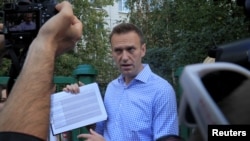Russia's Justice Ministry has branded opposition leader Alexei Navalny's nonprofit Anti-Corruption Foundation a "foreign agent" under a 2012 law that was widely criticized by the West for stigmatizing groups with the designation.
Navalny quickly rejected the ministry's Wednesday announcement, saying Russian authorities fear his foundation (FBK) because of the evidence of corruption it digs up on them.
"We demand that the Justice Ministry publicly explain to everyone and provide evidence that the FBK has received at least one penny of foreign money," Navalny said in a tweet.
"The actions of the Ministry of Justice are absolutely illegal and, obviously, by direct order of [President Vladimir] Putin… Putin is terribly afraid of FBK. After all, he relies on the power of thieves, bribe takers and corrupt officials. And we expose corruption. And we will not stop no matter what," he added.
The designation subjects the Anti-Corruption Foundation to the same requirements as foreign-funded nongovernmental organizations under which they must apply for inclusion in a government register, and submit regular reports covering their sources of funding, their objectives, how they spend their money, and who their managers are.
Signs of a nonprofit organization "performing the functions of a foreign agent were established during an investigation of its activities," the ministry said in its statement.
The Anti-Corruption Foundation was founded in 2011 by Navalny, Russia's most-prominent opposition leader and a lawyer by training who has doggedly pursued evidence of corruption at the highest level of Russian politics.
Its investigations regularly provoke public uproar over misuse of state funds -- in 2017, a probe into Prime Minister Dmitry Medvedev's wealth became a catalyst for a wave of mass rallies that erupted across Russia that March.
Navalny recently served a 30-day sentence for allegedly organizing recent protests against the exclusion of independent candidates from September elections to the Moscow city council.
Of the 30 or so candidates barred from running, five were affiliated with or employed by the Anti-Corruption Foundation.
In August, the foundation said all of its accounts had been blocked as the country’s powerful Investigative Committee proceeded with a money-laundering probe that threatened its survival as a self-professed force for elite accountability and political change.





